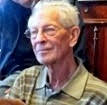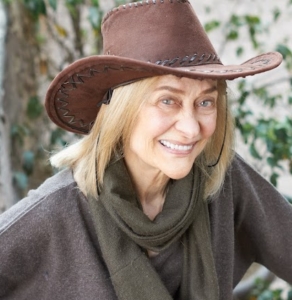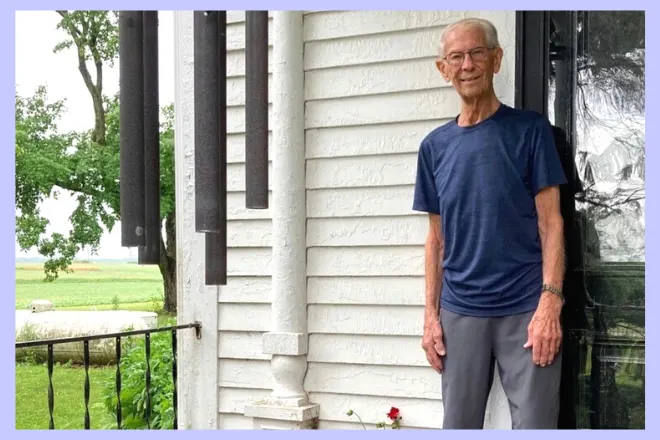 The interview which follows was conducted and written by Mike Yoder, the current chair of the board of the Illinois Mennonite Historical and Genealogical Society (IMHGS) which maintains the Illinois Mennonite Museum near Metamora, Illinois. Mike is a retired college sociology professor. The article was originally published for members of IMHGS in July 2021 in a print article for Illinois Mennonite Heritage Quarterly. It is republished here with Mike’s permission.
The interview which follows was conducted and written by Mike Yoder, the current chair of the board of the Illinois Mennonite Historical and Genealogical Society (IMHGS) which maintains the Illinois Mennonite Museum near Metamora, Illinois. Mike is a retired college sociology professor. The article was originally published for members of IMHGS in July 2021 in a print article for Illinois Mennonite Heritage Quarterly. It is republished here with Mike’s permission.
Maurice Yordy is my 92-year old uncle, the youngest of six siblings and only brother  of my mother (“A Beautiful Voice”). In addition to his role as former IMHGS Board Chair, Uncle Maurice has served in multiple “caring” roles – as a pastor, teacher, farmer, historian, and family storyteller. He served on numerous occasions as a “reading companion” with my mother following her diagnosis of Alzheimer’s. More recently, he was a dementia care partner in their home for his partner of 63 years, Patricia Harnish Yordy, following her diagnosis. Known among family members as “Uncle Max,” he is the beloved uncle of many nieces and nephews.
of my mother (“A Beautiful Voice”). In addition to his role as former IMHGS Board Chair, Uncle Maurice has served in multiple “caring” roles – as a pastor, teacher, farmer, historian, and family storyteller. He served on numerous occasions as a “reading companion” with my mother following her diagnosis of Alzheimer’s. More recently, he was a dementia care partner in their home for his partner of 63 years, Patricia Harnish Yordy, following her diagnosis. Known among family members as “Uncle Max,” he is the beloved uncle of many nieces and nephews.
The interview begins here with Mike’s preface.
Interview with former IMHGS Board Chair Maurice Yordy
Preface: Last year I interviewed centenarian and long-time IMHGS member and volunteer Guilford Zook. Recently I was privileged to interview Maurice Yordy at what was for many years the Ezra and Carrie Yordy farmstead and home just South of Eureka where Maurice was born and has lived his entire life except when away for college and I-W service in earlier years. Maurice is now in his nineties, is widowed from Pat Harnish Yordy, has lost all of his sisters, had recently suffered a hip injury and had reconstructive hip surgery, and even more recently had a fire destroy an outbuilding at his home. Yet he remains upbeat, hopeful and optimistic, strong in his faith and always looking to accentuate the positive. I hope to continue this series of interviews with long-time IMHGS leaders and volunteers, partly due to my conviction that we who are younger and less experienced have much to learn from them. I had visited Maurice and Pat at their home on several previous occasions. This time before I departed Maurice gifted me a copy of a devotional book he values, Sarah Young’s Jesus Calling.
Author: Mike Yoder, Current IMHGS Board Chair, July 24, 2021
Q: Tell me a bit about your family and this place where you were born, grew up and have lived almost your entire life.
A: Well, I was born here in this very house, which is close to what was once the first Woodford County Seat, Versailles. (Abraham) Lincoln tried cases there as a circuit riding lawyer before the courthouse was moved by oxen on skids to what was then Hanover, now Metamora. My father Ezra was the last of the self-supporting Mennonite pastors at Roanoke before they turned to salaried professionally trained pastors. He was a full-time farmer and a full-time pastor. My mother Carrie Good Yordy was from Rantoul near Fisher, where we often journeyed to visit relatives. Both my father and my mother were born near Flanagan. My grandmother Good was a Nafziger from Hopedale. Many visiting pastors have stayed here and eaten at this table, since it usually fell to the pastor and family to host them. One thing I learned was that they were all human. I could tell you a lot of stories from what I heard and observed here of them when I was a boy, but I always have had great respect for JD Graber, CF Derstine, SC Yoder and Paul Erb. I have planted my own crops here every year until this year, because of my hip injury. Now my nephew Jim Guth does most of my farming for me and looks out for me.
Q: Both your father Ezra and his successor at Roanoke, Wesley Jantz from Kansas, had wooden legs, right?
A: Yes, and a visitor once wondered how that was going to work when they washed feet after communion. Since the men stayed in the sanctuary to do that after the women had retired to a more private room, he was able to observe that for himself. He then joked that they had started a new custom, washing only one foot for each other, not both!! (laughs)
Q: You were a pastor at Highway Village (now East Peoria Mennonite Church) for many years, right? How did that come about?
A: It was certainly not in my plans to become a pastor, not in my wildest dreams! I always said I would never become a preacher. Clarence Sutter had been pastor there for 6-7 years, but left to go to Iowa. My brother-in-law Bob Harnish, himself a long-time pastor at Highway Village/East Peoria, asked me to teach Sunday School there soon after my marriage to his sister Pat. After I had taught Sunday School for a number of years, I was asked by the elders to consider being their pastor. My first reaction was “absolutely not.” My dad (Ezra) said that to be a Mennonite pastor at the time you had to have at least 80 acres of land and earn your living as a farmer and I was a teacher (of middle school science). Conference Minister Jack (Edwin) Stalter said to me that the most important thing was to let the people know that you love them. After an awful lot of prayer and hesitation, I said I could try it for three years. So, I did. It was 47 times a year in the pulpit on Sunday morning. You were expected to earn most of your own support, so I spent 23 years as both a pastor and school teacher.
The Ray Franks, Ray Phillips and David Frank families were the backbone of the church. They had no Mennonite background. The only people that did there were Pat and I and Don Litwiller. Highway Village was considered a mission church, a church plant. There came a time when the church had to decide if they were going to drop the name “Mennonite” or keep it. When many of the Highway Village folks went to (Illinois) Conference meetings, they had felt left out of the conversation by the ethnic Mennonites who were the dominant group. So I was somewhat surprised when the folks at Highway said “keep it.”
Q: When and how did you get involved with IMHGS?
A: It was only after I quit teaching that we got involved, Pat and I. I’m usually rather passive, but certain circumstances lead you into organizations. Already when I was a teacher, I became chairman of the local education organization. Then as a pastor in the Illinois Mennonite Conference I was on the committee that credentialed pastors. I had good experience in organizations both as a minister and as a teacher. Don Nolt at Freeport and Earl Sears at Tiskilwa were too far away to serve as chair of the IMHGS board, so I became chair by default. Julie Hendricks and I visited nine Mennonite churches to promote the organization. Ivan Bachman, Jack Stalter and Ken Ulrich were the guys that really kept things going. They had a real passion and vision for the organization, as did most of the original members. Dr. Deborah Reed of Eastern Illinois University and a Roman Catholic, was an ex officio member of the steering committee that studied the evolution of the organization. That’s how we got the panel display of Anabaptist origins that is still on display. We really have a fine museum and collection of farm equipment. There was some disagreement over how much emphasis should be given to our agricultural heritage. I learned that there are at least two sides to every issue.
I really did enjoy getting to know and working with other board members. I’m very glad we got a decent sound system and updated the archives.
Q: What major changes have you seen in American society and in the church?
A: Well, Mennonites used to be more separate from the rest of society than they are now. However, my father Ezra early on became a good friend of Don Salmon, pastor of the Eureka Christian (Disciples of Christ) Church. They exchanged Christmas cards for many years. Many young Mennonite draftees took a CO (conscientious objector to war) stance and Lester Hershey once sheltered a refugee/deserter from the Spanish military during the Spanish Civil War, so our stance on war really did set us apart.
The change from self-supporting to professional ministers was a big change across the church. I have lived through that. The emphasis of seminary training was mostly on knowledge of scripture and theology. Ministers called from outside the congregation don’t always know their members as well as did the lay pastors called by the church from among the membership. Interestingly, now we seem to be going back to some of that (lay ministry). I’m not sure that seminary can always give students a pastor’s heart. Some do have their students do a pastoral internship as part of their training, which is good. It’s a bit like the contrast between the old family doctor who made house calls and knew his patients well and really loved them versus highly trained medical specialists now who have tremendous knowledge but don’t always know their patients well enough to really care about them.
More recently the big issues in church and the larger society have been over women in ministry and leadership, racial prejudice and human sexuality. Current dialogue and disagreement over racial issues has been very divisive, as is human sexuality.
Q: Maurice, our first generation of IMHGS members and volunteers are rapidly aging and passing on. We seem to have more of a challenge now attracting new members and volunteers. Do you have any suggestions for us?
A: Yes, it might be a good idea to get each area congregation to designate a congregational representative for IMHGS and serve also as a volunteer.
At this point it was getting to be lunchtime, so we concluded the interview. Maurice gave me a copy of Jesus Calling. We went out on the porch to take some photos of him and I set down the book and my notes on the porch floor. After the photos were taken Maurice, despite recent hip surgery, bent down to pick them up for me!
With permission of the author, this article is republished from the July 2021 issue of Illinois Mennonite Heritage Quarterly. Learn more about Illinois Mennonite Historical and Genealogical Society here.
Credits:
Image of Maurice Yordy on porch: By Mike Yoder
Author: Mike Yoder, PhD, Emeritus Professor of Sociology

Posted by: Susan Troyer



Susan, I do enjoyed reading this article on your Uncle Maurice. Thank you for sharing. Yesterday we went to the Maple Lawn 100 yr. Celebration. Your uncle was there. He looked so good and was so spry! I had hoped to visit with him, but it didn’t happen. I still remember when you and I went out to their house to visit.
Thanks, Judy! I will let him know you were there. That’s great that you were able to attend!
This is an amazing article…a very thoughtful way to remember a special person in your family and the Eureka community.
Pat gave me piano lessons, so I learned to know both Pat and Maurice by taking lessons at their home. They were a major part of my Eureka community: friends of brother Jack and Ruth, part of Roanoke Mennonite Church and also your uncle. I treasure the memories of our lives in Eureka. I am printing this article to give it to my cousin, Roger.
Thank you, Cathi. I will confirm with him to be sure that he sees your comments. I know he will appreciate your thoughtful words!